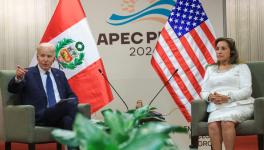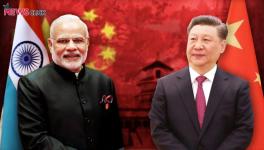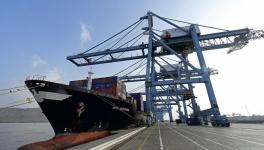How Vietnam's Economy Benefits From China's Pandemic Policy

Vietnam's adherence to an open economy makes it 'indispensable from a European perspective'
Vietnam was one of the few countries whose economy grew during the coronavirus pandemic in 2020. Many say this was due to early and rigorous action by the government and a zero-COVID strategy that kept case numbers low for a long time.
However, in summer 2021, before the omicron variant changed how countries approached pandemic policy, the delta variant's spread in Vietnam began to spiral out of control.
As infection rates climbed, factories from international companies like Samsung, Apple, Nike and Zara were forced to close for weeks.
Workers returned to their home villages in chaotic conditions. According to the World Bank, Vietnam's annual economic growth fell to 2.58%.
Vietnam decided to change its strategy and pushed ahead with a vaccination campaign, which had previously been neglected. Hanoi took a pragmatic approach and, unlike China, also used Western vaccines.
"Vietnam got its act together relatively quickly, and that shows the adaptive capacity of the Vietnamese system," Daniel Müller, manager at the German Asia-Pacific Business Association, told DW.
Meanwhile, almost all coronavirus restrictions have been lifted in Vietnam.
The risk of further lockdowns is low, said Dang Duc Anh, director of Vietnam's National Institute of Hygiene and Epidemiology, according to Reuters news agency. The Asian Development Bank forecasts Vietnam's economy to grow 6.5% in 2022 and 6.7% in 2023.

Production moving to Vietnam from China
There are signs Vietnam's economy is benefiting from its altered pandemic policy.
Many companies, especially in the electronics industry, are putting up a lot of money. South Korean electronics giant Samsung announced in February it would invest a further $920 million (€857 million) in Vietnam.
There is also a continuing trend of moving high-tech production from China to Vietnam.
Chinese electronics groups such as Luxshare Precision Industry, Goertek, and Taiwanese iPhone assembler Pegatron, are moving facilities to Vietnam, according to the German electronics trade magazine Elektronik Praxis.
"Vietnam will be one of the main beneficiaries of shifting supply chains," Raphael Mok from the consultancy Fitch Solutions told Reuters.
Müller from the German Asia-Pacific Business Association said that Vietnam has "always been in the spotlight" of German companies.
"The real run hasn't started yet, but that could change now because business dissatisfaction in China has now reached a level that didn't exist before," Müller said.
China is drawing increasing criticism with its zero-COVID policy and weeks-long lockdowns that can be set off by a relatively low number of infections.
The ongoing lockdownin the business and production metropolis of Shanghai has created global supply chain problems as factories and ports sit still.
Vietnam's challenges to growth
Despite good prospects, there are also challenges for Vietnam's economy. First, there is Vietnam's deep integration into global supply chains, which is both a blessing and a curse.
Vietnam's open economic policy of recent years integrating into global supply chains has made the growth success story possible in the first place.
However, the downside is that Vietnam is dependent on supplies of raw materials and component products, some of which are missing or delayed due to the pandemic.
Vietnam is also vulnerable to the increasing geopolitical tensions between the US and China.
Resilient supply chains are therefore key for Vietnam's continued economic strength. However, the country is not yet well enough positioned in this area, according to Müller.
Digital supply chains, for example, are not yet sufficiently in focus in Vietnam, he said. Digital supply chains comprise the digital networking of all processes and steps in a supply chain to monitor them in real time and make them even more efficient.
But it is not only supply chains that need to become more resilient, but also Vietnam's economy as a whole. Essential to this is a broader basis of value-added production, according to Müller.
"This requires further professionalization at all levels," he said, adding that Vietnam's education and training system, for example, needs to improve. "At the moment, it can barely keep up with the growing demand," he said.
Resilience also means strengthening domestic consumer demand. When the wave of coronavirus infections struck in the late summer of 2021, Vietnam's economy, which is dependent on foreign trade, was hit hard.
According to the World Bank, Vietnam's foreign trade ratio was 209% in 2020, which indicates a high level of economic dependence. With its population of just under 100 million, Vietnam cannot aim for economic development centered on domestic demand like China.
"Initially, it can only be a matter of balancing this out to a certain extent," said Müller.
Vietnam has recognized the problem, but it is struggling to take the necessary steps toward bolstering its consumer economy. Increased domestic demand would require larger segments of the population to benefit from economic growth. However, inequality is growing, as is the urban-rural divide, according to a March 2021 study in the trade journal Economies.
Vietnam's authoritarian capitalism
Another challenge, especially with regard to investments from Germany and the EU, is Vietnam's authoritarian political structure.
In its coalition agreement, the current German government has declared that it will pursue a "values-based foreign policy" that puts a greater emphasis on human rights.
Germany's Due Diligence Act (also known as the Supply Chain Act) also places higher requirements on companies with regard to environmental protection and human rights.
Although the act has been in force since 2021, it does not have to be implemented until after 2023, and then first in stages and depending on the size of the company in question.

Vietnam is not a partner of first choice in this regard, as is evident in the EU-Vietnam Free Trade Agreement (EVFTA).
The agreement was ratified in August 2020, however, its implementation continues to be held up. For example, the agreement requires Vietnam to allow for independent trade unions.
But the process is making only slow progress. To date, Vietnamese labor law does not regulate how and under what circumstances independent trade unions can be registered.
For now, it is clear that Vietnam cannot be included among like-minded partners in the context of values-based foreign and trade policy, according to Müller.
However, Vietnam does not adhere to protectionist trade policies like China, or the US under former President Donald Trump. Its adherence to an open economy makes it "indispensable from a German and also from a European perspective" as a location for labor-intensive manufacturing, Müller added.
In this position, Vietnam occupies a special place in Southeast Asia, he said.
Edited by: Sou-Jie van Brunnersum
This article has been translated from German
Get the latest reports & analysis with people's perspective on Protests, movements & deep analytical videos, discussions of the current affairs in your Telegram app. Subscribe to NewsClick's Telegram channel & get Real-Time updates on stories, as they get published on our website.
























